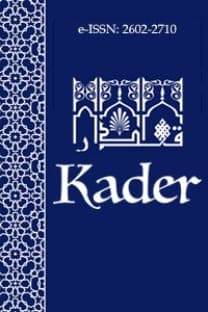Sartre ve İbn Sina Arasında Ontolojik Bir Karşılaştırmanın İmkanı Üzerine
It is clear that Avicenna, having considered the fact that the closest being to human is his own existence, sought to know and prove the existence of being/existence. The way in which it was to be done is ?to comprehend existence and its principle directly, without mediation.? In a parallel way, Heidegger thought that the way for one to understand existence is to understand and grasp one?s own existence. However, since understanding existence precedes understanding what existence is, Sartre, referring to this in his own way, coined the concepts en soi and pour soi and claimed that the real issue was for man to grasp his own existence. The aim of this article is limited to the efforts towards indicating the similarities and differences between the concepts of existence and essence that is the primary emphasis of the existentialist movement initiated by Descartes and given a new dimension by Sartre, and the concepts of existence-essence in Islamic philosophy, especially in that of Avicenna.
Anahtar Kelimeler:
-
Keywords:
existence, essence (quiddity), freedom, responsibility, necessary being being,
___
- Altıntaş, Hayrani, İbn Sînâ Metafiziği, Ankara 1985.
- Aquinas, Thomas, Varlık ve Öz, çev. Oğuz Özügül, İstanbul 2007.
- Aristoteles’in, II. Analitikler(Posterior Analytics), çev. Ragıp Atademir, İstanbul 1996.
- Atay, Hüseyin, Fârâbî ve İbn Sînâ’ya Göre Yaratma, Ankara 1974.
- Atay, Hüseyin, İbn Sînâ’da Varlık Nazariyesi, Ankara 1983.
- Ay, Mahmut, Sadruşşerî’a’da Varlık, Ankara 2006.
- Barnes, Hazel E., “Sartre’s ontology: The revealing and making of being”, Sartre içinde, ed. Christina Howells, Cambridge 1992.
- Bayrakdar, Mehmet, “Fârâbî ve İbn Sînâ’da Ontolojik Delil Üzerine”, İbn Sînâ Doğumunun Bininci Yılı Armağanı içinde, der. Aydın Sayılı, Ankara 1984.
- Burrell, David B., “Essence and Existence: Avicenna And Greek Philosophy”, Melanges, c. , Beyrut 1986.
- Cevizci, Ahmet, Felsefe Sözlüğü, Ankara 1997.
- Davidson, Herbert A., “Avicennas’s Proof of the Existence of God as a Necessarily Existent Being”, Islamic Philosophical Theology, ed. Parviz Morewedge, New York 1979.
- Dibaj, Mousa, “Being and Differentiation from Essence in Avicenna and Thomas Aquinas”, The Journal of Humanities, 313-4, Tahran 1991.
- Ernst Tugendhat, “Heidegger’s idea of truth”, Critical Heidegger, ed. Christopher Macann, Routledge 1996.
- Existentialism, ed. Robert C. Solomon, New York 1974.
- Fârâbî, ‘Uyûnu’l-Mesâ’il, el-Mecmû’ içinde, Kahire 1907.
- Fârâbî, Da’âva Kalbiye, Haydarâbad 1349.
- Fârâbî, es-Siyâsetu’l-Medeniyye, Haydarâbad 1346.
- Fârâbî, İsbât’ul-Müfârakât, Haydarâbad 1349.
- Foulquie, Paul, Varoluşçuluk, çev. Yakup Şahan, İstanbul 1991.
- Fynsk, Christopher, Heidegger Thought and Historicity, Cornell 1986.
- Gilson, Etienne, Tanrı ve Felsefe, çev. Mehmet Aydın, İzmir 1986.
- Gürsoy, Kenan, J. P. Sartre Ateizminin Doğurduğu Problemler, Ankara 1991.
- Heidegger, Existence and Being, (Introduction and Analysis by Werner Brock), Chicago Heidegger, Varlık ve Zaman, çev. Aziz Yardımlı, İstanbul 2004.
- İbn Manzûr, Lîsânu’l-Arap, trz, Beyrut. İbn Rüşd, Tehâfu’t-Tehâfut, nşr. Bouyges, Beyrut 1930.
- İbn Rüşd, Telhîs’u mâ ba‘de’t-tabi’a, thk. Osman Emin, Kahire 1950.
- İbn Sînâ, el-İşârât ve’t-Tenbîhât (İşaretler ve Tenbihler), çev. Ali Durusoy, Muhittin Macit, Ekrem Demirli, İstanbul 2005.
- İbn Sînâ, Kitâbu’ş-Şifâ, Metafizik I, çev. Ekrem Demirli-Ömer Türker, İstanbul 2004.
- İbn Sînâ, en-Necât, Kahire 1938.
- İbn Sînâ, “et-Tâlikât”, Aristo ’inde’l-Arab içinde, Mısır 1947.
- Kutluer, İlhan, İbn Sînâ Ontolojisinde Zorunlu Varlık, İstanbul 2002.
- İslam Felsefesine Giriş, ed. Peter Adamson, Richard C. Taylor, çev. M. Cüneyt Kaya, İstanbul 2007.
- Jackson, Timothy P., “Arminian edification: Kierkegaard on grace and free will”, Kierkegaard, ed. Alastair Hanay, Gordon D. Marino, Cambridge 1998.
- Jaspers, Karl, The Perennial Scope of Philosophy, İng. çev. Ralp Manheim, New York 1949.
- Jopling, David A., “Sartre’s moral psychology”, Sartre, Cambridge University Press, 1992.
- Kaufman, Walter, Dostoyevski’den Sartre’a Varoluşçuluk, çev. Akşit Göktürk, İstanbul 1997.
- Kaya, Mahmut, “Mâhiyet ve Varlık Konusunda İbn Rüşd’ün İbn Sînâ’yı Eleştirmesi”, İbn Sînâ Doğumunun Bininci Yılı Armağanı içinde, der. Aydın Sayılı, Ankara 1984.
- Kierkegaard, Fear and Trembling, İng. çev. Alastair Hanay, Londra 1985.
- Marcel, Gabriel, The Philosophy of Existentialism, İng. çev. Manya Harari, New York 1968.
- Marmura, Michael E., “Quiddity and Universality in Avicenna”, Neoplatonism and Islamic Thought, ed. Parviz Morewedge, New York 1992.
- Molina, Fernando, Existentialism as Philosophy, Prentice-Hall 1962.
- Mulhall, Stephen, Heidegger ve ‘Varlık ve Zaman’, çev. Kaan Öktem, İstanbul 1998.
- Natanson, Maurice, “Jean-Paul Sartre’s Philosophy of Freedom, Existentialist Ontology and Human Consciousness, ed. William L. McBride, New York-London 1997.
- Routledge Encyclopedia of Philosophy, ed. Edward Craig, V. 3, Routledge 1998.
- Ritter, Joachim, Varoluş Felsefesi, İstanbul 1954.
- Sartre, Being and Nothingness, İng. çev. Hazel E. Barnes, New York 1956.
- Sartre, Existentialism and Human Emotions, New York, 1957.
- Sartre, Varoluşçuluk, çev. Asım Bezirci, İstanbul 1989.
- Shehadi, Fadlou, Metaphysics in Islamic Philosophy, Caravan 1982.
- The Search for Being, (Essays from Kierkegaard to Sartre on The Problem of Existence), ed. William Kimmel, New York, 1962.
- Ülken, H. Ziya, Varlık ve Oluş, Ankara 1968.
- Başlangıç: 2003
- Yayıncı: Mehmet BULĞEN
Sayıdaki Diğer Makaleler
Kelamcılara Göre "Dillerin Kaynağı" Problemi İle İlgili Tartışmalara İlişkin Bir Değerlendirme
İslam Düşüncesinin Erken Döneminde Muhalefet ve Görüntüleri
Dinde Evrenselin Yerele Karşı Mücadelesi
Hayyam’ın Rubaileri: Din Felsefesi Açısından Bir Çözümleme
Meydan Okumaları Bakımından Kur'an Mucizesi
Beşeri Sorumluluk ve Fazıl el-Mikdad es-Suyuri el-Hilli'ye Göre Amellerin Yaratılışı
Kadı Abdülcebbar'ın Hıristiyan İlahiyatına Yönelttiği Teolojik Eleştiriler
